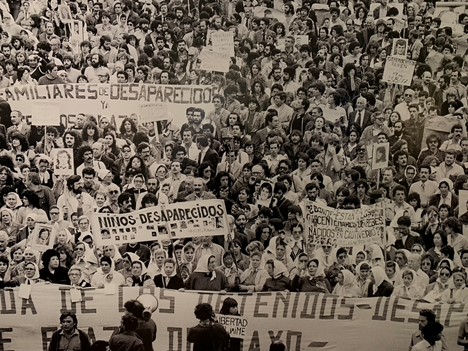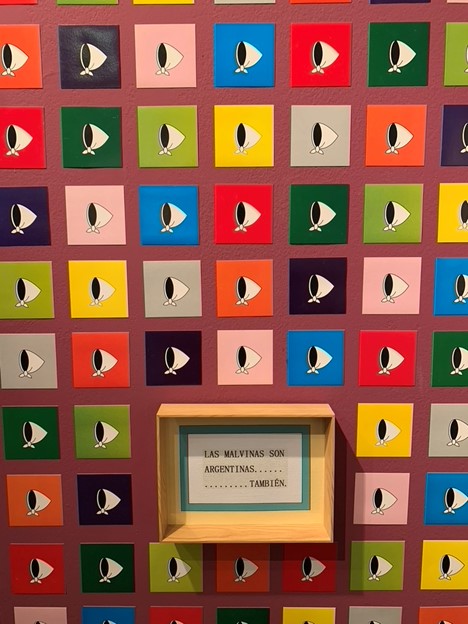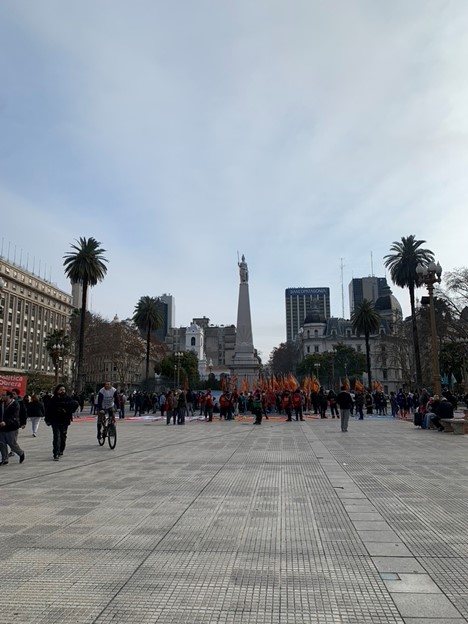
Upon arriving in Argentina, I immediately knew that I would be challenged to learn more about the Spanish language and the country’s complex history, one that continues to define society, politics, and memory. As a history major, I have always preferred learning about events and people first-hand. Coming to a country still emerging from the shadows of a dictatorship has given me a first-hand account unlike any other I have experienced. Before departing for Argentina, I thought I had a strong understanding of its 1976-1983 dictatorship; however, talking to people who lived through the dictatorship has allowed me to learn more.
During the first week, members of the CPM introduced us to two guest speakers who shared their experiences during the dictatorship; both were sisters of individuals who had been kidnapped and disappeared during the dictatorship. Silvia Fontana’s account struck me the most. She told the story of how her sister, Lili, had been taken from their home while she was pregnant. The Fontana family did not give up searching for both Lili and her son, who was appropriated by a military family. What fascinated me was the relentlessness of the Fontana family in their search for Lili’s son, whom they found 27 years after his birth. This search, to me, demonstrated the desire to return their identities to the children who had been appropriated. These kinds of stories allowed me to put the history of the dictatorship into context while simultaneously understanding how it continues to impact Argentine society.
Additionally, the end of the first week signaled the beginning of my decision to work with the Committee Against Torture. Before I arrived in Argentina, I had a different understanding of what torture was, what it entailed, and by whom it was perpetrated. While working with this team, I have learned that torture against people deprived of their freedom is perpetrated by a system of cruelty supported by the State that is designed to cause suffering. This internship has opened my mind to a more holistic definition of torture and the physical, mental, and emotional impact it has on imprisoned individuals. Although this internship focuses on Argentine prisons in the Buenos Aires Province, many of the violations against individuals here also occur in the United States.
During the second week, I started working with the team that interviews victims, and their family members, who suffer from torture in penitentiary units. I was able to read about the conditions in which imprisoned people live and how these constitute direct violations of their rights, feeding the system of cruelty they find themselves in. This week, I familiarized myself with a woman’s case who experienced torture in all the penitentiary units where she was detained. This case helped me contextualize the role gender plays in the prison system. Women and trans individuals face additional violations against them. Early on this week, I realized that the topic of pregnant women and women with children in prisons highly interested me because they were complex cases that required greater attention. Working with this team has been a rewarding experience because it has allowed me to learn more about what it means to fight for human rights within systems designed to perpetuate suffering.
Outside of working with the Comisión Provincial por la Memoria, in my first weeks here I was presented with the deep and vibrant culture of political activism. On my first trip to Buenos Aires, which also happened to be on Argentine Independence Day (July 9), I noticed the political mobilization of multiple groups in the Plaza de Mayo who were fighting for the same rights. While witnessing this march, I soon realized that these groups came together in the nation’s capital from many southern cities and other places around the country. What left me most in awe was the involvement of family units, including young children, that came together to voice their concerns, and the presence of music which made the march seem like a celebration of their fight. I was surprised, yet thrilled, to see this because it is not something that occurs much in the United States. Witnessing this march allowed me to appreciate Argentine political culture even more.





